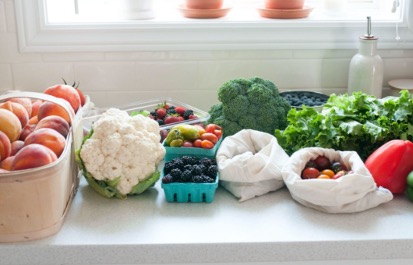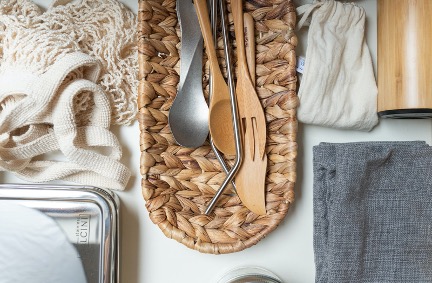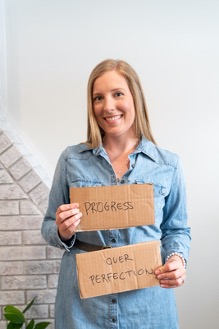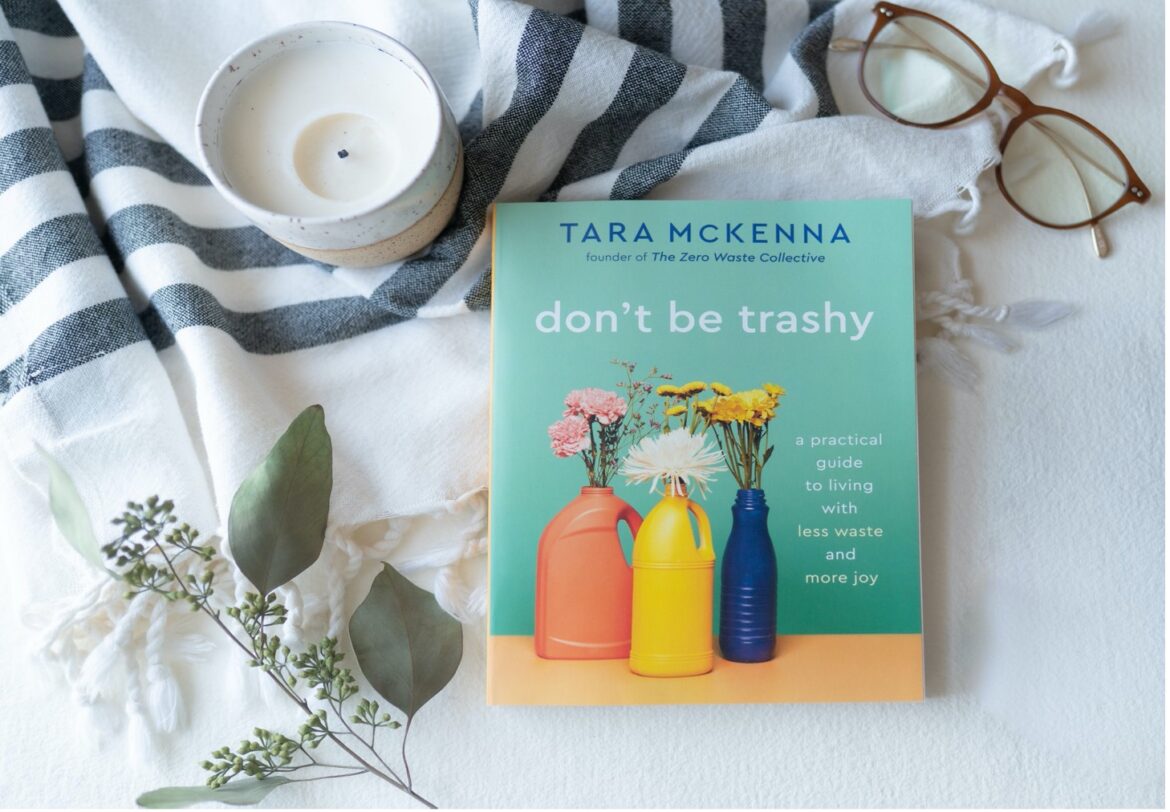Tara McKenna, the founder of The Zero Waste Collective, believes that everyone has the right to pursue a more minimalistic and eco-friendlier lifestyle. But she also believes that we should work towards zero waste without the guilt of our individual shortcomings, recognizing that our current society makes it very difficult to achieve that elusive zero. McKenna is a new mom and seasoned environmental advocate who maintains an educational blog in addition to having recently published the book, Don’t Be Trashy: A Practical Guide to Living with Less Waste and More Joy. In our interview, she shares practical and easily implementable tips for those seeking to streamline their lives and pitch in for a healthier environment. We appreciate her time and thoughtful responses and know that you will too!

- How long have you been interested in the zero-waste lifestyle?
I have been involved for about five years now. When I first started the lifestyle, I went all in! I brought our household as close as possible to the “zero” in “zero waste.” Of course, it’s not as simple as reducing our personal waste because no matter how much or how little waste we reduce, there are still systems that create trash outside of what we bring into our household. For example, even if we choose naked (i.e., plastic-free) produce at the grocery store, it still had to be packaged to get to the store.
We got to a place in our household where the sustainable lifestyle I aspired to live wasn’t maintainable anymore. I realized it was time to find a better balance, so we landed on progress over perfection instead. And that’s the type of lifestyle I’d like to see more people getting on board with! Being more eco-friendly and low waste, without being perfect, and doing it in a way that works for your lifestyle preferences, circumstances, and budget.
- What was the catalyst for going low waste in 2017?
In 2013, I was in Bali, Indonesia, for a family vacation. While snorkeling, I was devastated to find trash floating with the fish. This is not the first time I encountered litter – all I have to do is go for a walk in my neighborhood to find trash on the ground – yet this moment was particularly pivotal for me because I had hyped up the destination in my mind as a pristine tropical paradise. Bali is a tropical paradise, no doubt, but it’s so sad that we’re ruining these destinations worldwide due to our disposable lifestyles. Tropical or not, we need to protect our planet.
- What has changed in your personal ability to reduce waste since you began your journey?
A lot has changed in five years! A lot more shops have popped up where I live that support low waste living, like refill shops and bulk stores offering bring-your-own-container programs. That said, a lot has changed since the pandemic started in 2020. Pretty quickly, stores began to deny the use of shopping with your own containers, and for a little while, even reusable shopping bags.
With the onset of the pandemic, our household trash increased. Thankfully, many shops that denied reusable shopping bags and containers have since reversed those restrictions. On top of that, innovative companies have been looking at other ways to reduce waste from takeout, like offering reusable container programs where you can return the containers to be sanitized and reused. Similar initiatives are becoming popular for takeout coffee cups too!
So, what I can say is, reducing trash isn’t a linear journey. Sometimes we create more waste; Sometimes, we produce less of it. Sometimes it’s easier, and sometimes it’s more challenging. I’ve come to a place where I’m more flexible, but I still live my life through a low waste lens and reduce my waste whenever possible.

- What are your tips for new mothers who want to reduce their waste?
First, being a new mother is a massive change! So, take time to lean into the new role, the healing journey, getting to know your new little human, and getting rest.
When there’s a moment to think about reducing waste in parenthood, here are some ideas:
- Share and trade resources with your community of mom friends and through groups on Facebook.
- Buy secondhand; there are so many baby products out there already, chances are you’ll find what you need, and it’ll be in great condition because babies outgrow stuff so quickly!
- You don’t need that much, to begin with; there are a lot of gadgets out there that make a lot of promises, so just make sure you need the item before getting it! Most extra stuff we can do without, as babies don’t need a lot
- Choose reusable diapers if you feel up for it, but no pressure if you don’t; it’s easier and way less gross than it sounds!
- What products do you feel are “must-haves” for people who want to work toward a zero-waste lifestyle?
No products are required for living a low waste lifestyle. That said, I do recommend having a zero-waste kit available for life on the go, including reusable items like:
- Utensils
- Food containers
- Water bottle
- Coffee cup
- Napkin
- Shopping bags
- Produce bags
- Handkerchief
The best thing to do is to use what you already have. Then when you’re ready, you can add items to your zero-waste kit or other swaps when you’ve used up the products you already have. It doesn’t have to happen overnight!
- How have you seen the zero-waste movement grow over the years?
The zero-waste movement has grown so much. When I first started this lifestyle five years ago, finding the supplies I was looking for was harder, including products or shops that offered refills. Now there are so many more options available!
Even if you don’t have direct access to zero waste and refill shops, there are delivery programs where you can get refills shipped to your door. You can also have low-waste refills, which significantly reduce plastic consumption, delivered, as well as concentrated products.
- How do you think the movement can become more inclusive and effective?
The movement needs to be available and accessible to everyone. For example, it’s easy to assume that everyone can buy plastic-free produce and chop up fruit and veggies themselves at home. Yet some people need to buy pre-cut fruit and veg, which comes in plastic.
We should never make assumptions about people’s abilities and needs. Essentially, we need to make the zero-waste movement inclusive for all abilities and acknowledge that not all solutions will work for everyone, and that’s okay.
The zero-waste movement also needs to be more inclusive of diversity, and to do that, all voices in the movement need to be represented and elevated. BIPOC (Black, Indigenous, and people of color) have been underrepresented, and that has started to change but has a long way to go!
We all have so much to learn from other people’s experiences.

- You have spoken at several events. Who have you met, and what have you learned from them, at conferences, meetings, and shows?
I’ve had the opportunity to meet Bea Johnson at an event she was speaking at (pre-pandemic), and she really kickstarted the zero-waste lifestyle movement. It was great to meet her in person!
Although I haven’t met these people in person, I love learning from David Suzuki, an environmental activist, science broadcaster, and author of many books, Julia Watkins, author of Simply Living Well. Christine Platt, author of The Afrominimalist’s Guide to Living with Less, and Joshua Becker, creator of the blog Becoming Minimalist, among many others!
- What do you do during the holidays and your birthday to reduce the number of items coming into your house?
Such a good question! It’s a sensitive topic -for sure- because it can get quite uncomfortable for people to set boundaries around gifts. Gift-giving is a love language, after all! That said, it’s important to set boundaries; otherwise, we can get bombarded with stuff we don’t want, which can – and does – end up collecting dust or being put in the trash.
With family, my husband and I use a wish list system where we buy gifts for one another based on what everyone needs. Gifts also don’t have to be tangible items, either! We often gift experiences and donations to important causes.
Consumables also make great gifts! And now that we have a baby, we suggest that if people want to give her gifts, contributing to her education fund is welcome and preferred unless we have specific items she needs.
- What did you learn while writing your book, Don’t Be Trashy?
While writing my book, I took a much closer look at the issue of planned obsolescence. That’s the business strategy of designing products to become obsolete. In other words, products can be designed to break and hard to repair (think kitchen appliances that don’t last), intended to go out of style (think fast fashion) and be designed to make it hard to keep up with technological advances (think cell phones).
While researching this topic for my book, I was amazed at how blatant and planned this movement was in the early 1900s. It really picked up post-WWI when planned obsolescence was a strategy used to boost economic production.
Planned obsolescence is still an issue today and a legacy from the 1900s that seems to persist. With that in mind, we as consumers need to use our access to information to buy timeless, built-to-last, and more easily repairable products.
- Can you speak about the guilt many feel when trying to achieve zero waste?
I still feel guilt from time to time! When I first started documenting my journey to zero waste on Instagram, it seemed as though there was no shortage of critics out there telling me that I wasn’t doing enough.
At the end of the day, it’s not about dragging people down with these criticisms. What’s important is that we’re making changes, and it doesn’t have to be perfect. We’re all human, and society doesn’t make it easy to live less trashy.
Throw the guilt to the wind, make better choices when possible, and live life to the fullest!

- What does “sustainable” mean to you?
I really like the quote: “We Do Not Inherit the Earth from Our Ancestors; We Borrow It from Our Children” – origin unknown. Similarly, I believe that sustainability is about living today without compromising the needs of future generations. To do that, we need to consume less overall because earth overshoot day is coming earlier and earlier every year.
Earth overshoot day marks the date when humanity’s demand for ecological resources and services in a year exceeds what Earth can regenerate that year. In 2021, earth overshoot day was July 29.
- What are your tips for those who like their wardrobes to stay in fashion?
First, build your capsule wardrobe. This wardrobe is made up of clothing pieces that are your heavy hitters – the pieces you wear most often. Not sure what those are? Look at the items you’re wearing and washing the most. Then, each season create a wish list of pieces that you’d like to add to your wardrobe and keep it minimal if possible. Mix up your wardrobe with fun accessories, and you can even rent special pieces for the season or swap clothes with friends.
You don’t always have to buy new, either. Check out secondhand shops for great styles! I love consignment shops because their pieces tend to be better quality and more on-trend. That said, timeless style is the best way to reduce our textile waste. Trying to keep up with ever-changing trends is a race we cannot win.
- What advice do you have for those who want to reduce their household waste, but are living with others who do not share the same goal?
You do you, first. We can’t tell others how to live, and we certainly don’t want others to tell us how to live our lives either. So, if others don’t want to get on board, that’s okay. Just do what you want to do to reduce your waste. They may get on board; they may not! Always lead by example and share knowledge when it makes sense.
However, if it’s a matter of not sorting waste properly into appropriate bins (trash, recycling, compost), then a household meeting would be helpful to get everyone sorting according to your municipality’s system.
- What thoughts go through your mind before making a purchase?
I ask myself a few questions:
- Do I need this?
- Will I use it?
- Will I care for it and repair it?
- Could I use something I already have?
I try to avoid impulse purchases whenever possible, and these questions help me do that!
- What thoughts go through your mind before donating an item?
Most of the time, if I have items to pass along, I start by asking family and friends whom I think may benefit from and enjoy that item if they’d like it. If they’re not interested, I try to sell it or put it up for free online using Facebook marketplace or similar platforms. If all my options are exhausted, then I donate the item. If possible, I try to give each item a new home, but it doesn’t always work out perfectly, and I don’t always have the time. I do my best, and that’s all we can do!
The next best thing we can do is avoid adding more items into our home that we would likely end up donating down the road. Everything has a life after it’s left our home, whether with other people or sitting in a landfill. So, if we consume less, we’ll have less to donate!
- How can political engagement make a difference in our long-term ability to reduce our waste?
Political engagement is a great way to get our voices heard for the policy and legislative direction we want to see. It doesn’t always go the way we want, but at least getting involved provides the opportunity to see change happen.
- What societal infrastructure (i.e., composting programs) would benefit the zero-waste movement?
Compost is super important for sure! Organic waste like food waste that ends up in landfills creates methane, a greenhouse gas that’s worse than carbon dioxide as a greenhouse gas.
In addition to composting, we need extended producer responsibility, a program in which producers are given a significant financial and/or physical responsibility for the treatment or disposal of post-consumer products (ideally, this would be reuse and/or recycling).
Essentially, we need to see more programs that make it easier for people to live zero waste. Society isn’t set up to make it easy to live with less waste. More programs and infrastructure, and policies are needed! Until then, read Don’t Be Trashy: A Practical Guide to Living with Less Waste and More Joy!
 Food
Food Farmers
Farmers Sustainable Living
Sustainable Living Living Planet
Living Planet News
News